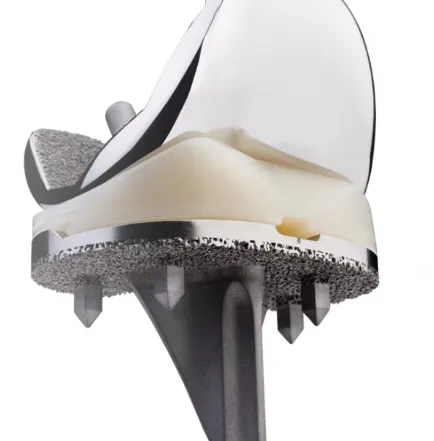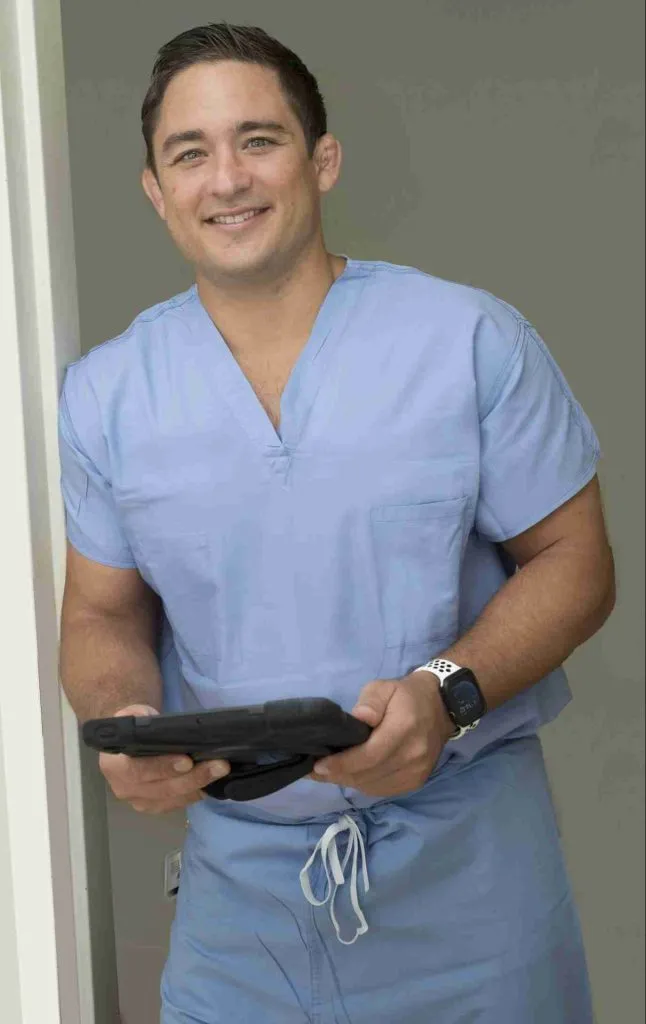What to Expect Your First Year After a Total Knee Replacement
Getting Back to Normal
Talk with Your Knee Replacement Surgeon Today!
Choose Dr. Morton as your Knee Replacement Surgeon Today!
- Board-certified, Fellowship Trained Knee Surgeon
- Experienced Orthopedic Surgeon
- Nonoperative and operative treatments available
- High success rate in treating knee replacement
- Minimally invasive surgery
- Well-versed with modern techniques such as same-day knee replacements and robotic-assisted joint replacements.
- Fellowship-trained and specialist in knee surgery
- Takes care of revision knee replacements and complex operations
- Trauma Surgeon at Level 1 Trauma Center – Queen’s Medical Center
Knee replacements used to be very invasive, requiring several days in the hospital. But with advancements in surgery, total knee replacements are now minimally invasive and completed with robotic-assisted technology. This means you get to go home the same or next day and experience a more rapid recovery.
It is essential to recognize that there is still a lot of healing throughout the first year after your knee replacement. From your incision healing, regaining your mobility and strength, walking without a walker, and then getting back to doing what you love, it is a long but exciting journey.
To help guide you through this recovery process, let’s look at what happens throughout the first year, breaking it down by important milestones. But first, here are a few key things to remember:
- You must stay ahead of the pain by taking pain medication as prescribed and icing frequently.
- Physical Therapy will be painful, but it is necessary to help you regain your function.
- And most importantly, keep in mind that you will eventually reach your goals; it may be painful and a lot of work, but the outcome is more than worth it.

What to Expect During your First Day after Knee Replacement Surgery
When you wake up after surgery, you most likely won’t be experiencing pain as local anesthetics may still be in effect. You will follow a multi-modal modern pain protocol right away to help manage your pain throughout your recovery. This includes having IV or oral analgesics while you are still in the hospital and then continuing with oral medications throughout the beginning stages of your rehabilitation.
These medications may include opioids, acetaminophen, and anti-inflammatories. Other natural pain-relieving modalities include cryotherapy, elevation, and compression. Aspirin is also a critical medication that will begin during your first day after surgery. This should be taken daily for the first month to help decrease any risk of developing a blood clot.
You won’t see your incision yet because of the bandages. Still, your incision will be fully closed with a sterile dressing and bandage. You will also be wearing sequential compression devices (SCD)s on both legs to help control the swelling and prevent blood clots.
After surgery, you will be able to transfer to a sitting position. Then you may begin walking with a walker. If everything goes well in terms of pain, you will be allowed to go home on the day of surgery. Under some circumstances, you may have to stay the night. If that is the case, you will have Physical Therapy that day in your room where they will help you transfer, walk, and learn the best positions to place your knee into while you rest.
Whether you get to go home the day of surgery, or the day after, you will want someone to drive you back home and most likely stay with you for the first two weeks. Getting into the car as a passenger can be challenging, as you may have to bend your knee further than you have in a while. Have your driver come in the most spacious car available, scoot the seat back, and carefully transfer into the vehicle.

What to Expect During your First Week after Knee Replacement Surgery
Throughout the first few days back home, you will notice more pain. And you will also start to see swelling and bruising. It is important to stay consistent with your pain medication, cryotherapy, SCDs, and elevation to manage these symptoms. This is emphasized, not just for your comfort but for your ability to go through Physical Therapy successfully.
During the first or second day at home, you will begin Physical Therapy, either at home or in a clinic.
Either way, during this time, it is imperative to gain full function of your quadriceps muscle, the ability to straighten your knee completely, and the ability to bend your knee. This will allow you to regain your independence and return to the things that you love to do.
The bandages will stay on for at least a week. At this point, you will have your first check-up with your surgeon to ensure healing is going well.
There are a few key things to remember during this first week:
- You will continue to walk with a walker.
- Avoid any twisting forces to your knee.
- You may want to sleep with a pillow or wedge to help elevate your leg. Avoid sleeping with the pillow under your knee.
- During this time, you do not want to keep your bandage wet, so carefully bathe.
- Stay ahead of the pain. Take your pain medication as prescribed. This will allow you to perform your Physical Therapy with less pain and more mobility.

What to Expect During your First Month after Knee Replacement Surgery
Pain management is still a priority. For the first four weeks, the SCDs will be discontinued, and you will wean off of the assistive device as you are ready. You will wean off of narcotics but continue taking acetaminophen, anti-inflammatories, and Aspirin as prescribed.
This is a time when you get to become more functional, comfortable, and independent, but it is not time to go all out just yet. You may be itching to get back to things you love, but you still have many things to work on, such as mobility, strength, balance, and endurance. And, living in Hawaii, you probably love the water, but you still cannot get your incision wet, not until week 6.
This is the time when you will see very noticeable improvements, and you should be able to bend your knee to 90 degrees or more. Walking will feel stronger, but you will have to make sure you don’t get into the habit of favoring the surgical leg. You will feel more strength and stability, but not equal to how your other feels. Plus, you may be able to begin driving yourself again by the end of the month.
The swelling and bruising will still be present but should start to decrease as the weeks go on. You will find areas of your leg to be more sensitive than others and some areas of numbness. Over the first year after surgery, you may feel different sensations like this. It is a normal part of the healing process.
There are a few key things to remember during this month:
- Take your Physical Therapy seriously.
- Physical Therapy will most likely hurt, but it is imperative to follow through so that you can gain your range of motion and strength
- Continue to be consistent with your prescribed medications
- Don’t go into the water yet.

First 3 Months after Knee Replacement Surgery
Pain and swelling are now minimal, and the bruising has fully resolved. Your incision has fully healed. In fact, the knee that was replaced is beginning to look a lot like your other knee.
And at week six, you are now you are ready to get back into the water! Another significant milestone of this phase is the ability to bend your knee almost as far as your other knee.
Squats, lunges, and other challenging lower body movements can be incorporated into your Physical Therapy. Resistance and other external weights can be applied to increase the amount of work and strength your legs are going through.
There is no evidence stating that you cannot return to what you love after having a knee replacement, whether that be walking on the beach, surfing, playing tennis, or hiking with your family. But now is the time to put in the work so that your whole body, not just your knee is ready to return.
The progressions you make after a few months after surgery start to slow down. But don’t lose sight of your goals.

First 6 Months after Knee Replacement Surgery
Physical Therapy appointments have decreased to only once a week. Since your strength and mobility have greatly improved, there are many more exercises that you can do on your own at home. However, it is best to continue to have your therapist guide you through treatment to ensure full functionality.
You may find yourself walking longer, going on small hikes, and returning to other lighter activities such as nine rounds of golf. This is a fun and exciting time but make sure to still work on your areas of weakness.

Recovery During the Final 6 Months of the First Year after Knee Replacement Surgery
During the final six months of your first year post-operatively, you can still expect soreness and stiffness. Make sure to remember the exercises your Physical Therapist taught you so that you can continue to work on this as needed.
You can still expect to see improvements as you return to more and more functional activities. At the end of the first year, you should feel strong, stable, and happy with your decision to have your knee replaced and to have your life back!

Frequently Asked Questions about Knee Replacements
Modern knee replacements are performed on an outpatient basis. Many patients are able to go home on the same day, and sometimes the following day. This is because our pain control and anesthesia have significantly improved. Some patients who do not have adequate support at home will require a skilled nursing facility to recover until they are strong.
Long-distance travel should usually be avoided until at least after your initial post-operative visit with your surgeon. The concern with long-distance travel is the possibility of the development of a blood clot, or missing a postoperative complication.
Once you are on a long trip, Dr. Morton recommends that you get up to stretch or walk at least once per hour during a long trip. Taking 81mg of aspirin daily is a useful adjunct. Dr. Morton recommends starting aspirin 2 days before your trip, and 2 days after your trip to avoid blood clots. You may want to talk with your primary care physician if you have a history of stomach ulcers, allergies, blood clots, or bleeding disorders. Usually, patients will desire an aisle seat or a lay-flat seat for long distances during their initial recovery.
Your medical history will be carefully evaluated to ensure that you are a good candidate to return home on the same day after your knee replacement. After a discussion with your physician, we will decide if you can return home safely. We make sure that all of our patients work with a physical therapist to ensure that they can safely navigate the obstacles in their home before being discharged.
Your surgeon will evaluate your medical history and see if you are a good candidate to return home on the day of surgery. With modern medicine, anesthesia, and surgical technique, many of our patients are able to return on the same day as their knee replacements.
Blistering can be a side effect of the bandages or swelling after your replacement. Blistering is a rare phenomenon. If you have blistering, please call me to make sure that there are no complications to be concerned about.
Yes. In order to implant your new knee, we have to move the muscles and soft tissue to the side. Cutting the bone can cause a significant amount of blood flow. This will cause a large amount of bruising and discoloration after surgery.
These devices have fallen out of favor in the orthopedic community. We have found that these devices are expensive and have not made a difference in return to motion after a knee replacement. These have not been used for years by most orthopedic surgeons.
During a knee replacement, we cut through the infra-patellar branch of the saphenous nerve. This nerve is responsible for the sensation on the outside of your knee. This usually disappears slightly with time, but you will always have a numb area there. Some patients can develop a painful neuroma. I am happy to talk about any of your concerns about this numbness.
This is a complex question depending on what job type you are doing.
Desk job: I tell most patients that they will feel well enough to begin working around two weeks after surgery. Some patients who are gung-ho will even start working immediately after surgery.
Light Labor: Light labor that requires frequent walking or light lifting. Some patients may require 6 weeks to 3 months before returning to work. Close monitoring will be needed to help you determine when you are safe.
Heavy labor: Construction and other types of manual labor usually requires at least 3 months of recovery. Some patients will have to change their careers depending on their demands. Talk with your surgeon before returning to work.
We have our patients walking on the same day. patients who are expected to go home will have a course of physical therapy in the post-op unit to ensure that they are safe to go home.
This depends on if you drive a manual transmission car, and if your replacement involves your right or left knee. Patients who undergo a right knee replacement are going to take longer to start driving – sometimes up to 6 weeks.
I allow patients to drive when they reach the following goals: 1. No significant pain while driving, 2. No longer taking narcotics, 3. Able to stop in the event of an emergency such as a small child crossing the road.
Most patients are able to achieve this with a left knee replacement around two-weeks after surgery.
Modern knee replacements have made a drastic improvement with the invention of highly cross-linked polyethylene. Polyethylene is the plastic component within your knee replacement. Traditionally, these plastic components are expected to last up to 20 years in 90% of people. With newer plastic components, we are hopeful that knee replacements will last even longer.
There are newer knee components including those made from Vitamin E or ceramic, which may reduce the wear of the plastic component.
The length of time that a knee replacement will last is variable. While the current generation of knee implants are expected to last most of our patient’s lifetimes. Orthopedic surgeons worry that high levels of activity, weight, or other complications such as infection or loosening could lead to the need for revision.
Custom implants and customized jigs are a technology that has not demonstrated to have brought significant value for patient outcomes. These devices have not been demonstrated to be more reliable than traditional knee replacements. It is likely because it does not take into account your soft-tissue anatomy at the time of surgery. This is the difference that robotic joint replacements provide.
While the science is conflicting on whether injections are associated with infected knee replacements, many insurance companies have made limitations on joint replacements after injections. If you have an injection, most insurance companies will not support payment for a knee replacement for 3 months after your injection. This is with the health of our patients in mind. Avoidance of infection is of utmost importance as an infection can have devastating consequences.
Robotic joint replacements are a hot-topic in hip and knee replacements. While you may not need a robot to perform your surgery, robotic knee replacements are able to provide a much more accurate positioning of your knee replacements and personalize the implantation to your anatomy. Much like anterior hip replacements are able to position our implants better and improve outcomes, I believe that robotic joint replacements can make the same improvements for knee replacements.
Partial and total knee replacement surgery have excellent track records. There are risks and benefits to both operations. Partial knee replacements often leave patients with a more “natural feeling” knee, while total knee replacements are able to provide the longest term result with lower risk of re-operation.
I usually recommend that people wait three months prior to having any dental work done. Please ask for antibiotics, especially within the first year of your surgery.
Tobacco use is known to be a significant risk factor for loosening, infection, or wound healing problems. Minimizing your tobacco use or quitting before surgery will make a significant impact. If you are able to quit for life, you will significantly reduce your risk of other complications to your overall health as well. Learn more about tobacco effects on joint replacements here.
Some patients find that once they lose a significant amount of weight after bariatric surgery, they do not need to see an orthopedic surgeon for a knee replacement. If you are able to successfully lose enough weight before surgery, you may also reduce the chance of a complication after your surgery. Obtaining a healthy weight should be your goal.
Infections in your mouth are a significant risk factor for a knee replacement infection. We recommend that any evidence of a dental or gingival infection be addressed prior to surgery. Some clinics even require mandatory dental clearance prior to surgery. After surgery, we will often provide patients with antibiotics prior to deep cleaning or any major dental work.
Even if you feel fit and healthy, you may be asked to lose weight before knee replacement surgery if you are heavier. Much of the research on complications following knee replacement surgery has been focused on patients with a high body mass index (BMI). In fact, Queen’s Medical Center will not allow the scheduling of any surgery of patients with a BMI greater than 40. This is because patients who are heavier are at higher risk for the following complications:
– Infection
– Component loosening
– Poor wound healing
– Blood clots
– Pulmonary embolism (blood clot travels to the lung)
Typically, we ask patients to aim for a BMI that is less than 40 prior to surgery. We would prefer patients to obtain a BMI less than 35 as this will significantly lower your risk profile.
Running can put a tremendous amount of stress across your new implant. I would be very careful before starting a heavy-exercise program on your new knee replacement. Despite this, you can still be an athlete and do certain types of activities. The American Academy of Orthopaedic Surgeons (AAOS) recommends the following activities with a total knee:
– Bicycling
– Calesthetics
– Swimming
– Low-resistance rowing
– Gentle Skiing
– Walking & Hiking
– Low-resistance weightlifting
Similarly, the AAOS advises against high-impact activities:
– Baseball
– Basketball
– Football
– Hockey
– Soccer
– High-impact aerobics
– Gymnastics
– Running and Jogging
– Powerlifting
Traditionally, knee replacements were reserved for patients who were elderly with severe knee arthritis. Concerns regarding patients who undergo knee replacement at a younger age are focused on the wear of the knee replacement components. Any patient who is in their 40’s and 50’s is considered “young” for a knee replacement. However, they may still be a candidate for a knee replacement if they understand the limitations of the implant and have failed non-operative treatment.
The average age of patients today undergoing a knee replacement is 65 years old. While patients under the age of 50 are the fastest-growing segment of the population undergoing knee replacement surgery, many orthopedic surgeons have reservations.
Related Pages
Faster Recovery: The Subvastus Advantage in Knee Replacements
Total knee replacement (TKR) surgery is a transformative procedure for patients suffering from severe knee arthritis or injury. Among the various surgical techniques, the subvastus approach, Quadriceps Sparing Approach, stands out as a minimally [...]
Knee Replacement Success Rate
Introduction Knee replacement surgery, or knee arthroplasty, is a procedure that has transformed the lives of millions of patients suffering from severe knee pain and mobility issues. Traditionally, the success of such surgeries has [...]
Choosing the Right Specialist for Regenerative Medicine: Ensuring Safety and Efficacy
Regenerative medicine is a rapidly advancing field in healthcare, promising innovative treatments that help regenerate tissues, alleviate pain, and restore function. These treatments require technical knowhow when obtaining platelet rich plasma, bone [...]
Demystifying PRP Therapy: Understanding the Science Behind Platelet-Rich Plasma
In the quest for advanced healing techniques, Platelet-Rich Plasma (PRP) therapy emerges as a beacon of hope for those suffering from various orthopedic conditions, including osteoarthritis and tendon injuries like tennis elbow. This cutting-edge [...]
Moving Forward without Cement: The Pros and Cons of Uncemented Knee Replacements
Introduction Modern medicine continues to break new ground, redefining what's possible. One field where innovation is unceasing is orthopedic surgery, and one of the groundbreaking procedures reshaping the sector is uncemented knee replacements. As [...]
Speedy Recovery: Practical Tips for a Faster Recovery After Knee and Hip Replacement
Introduction Hip and Knee Arthroplasty, more commonly known as hip and knee replacement surgery, is a widely performed procedure that offers a new lease on life for individuals grappling with severe knee conditions, including [...]







